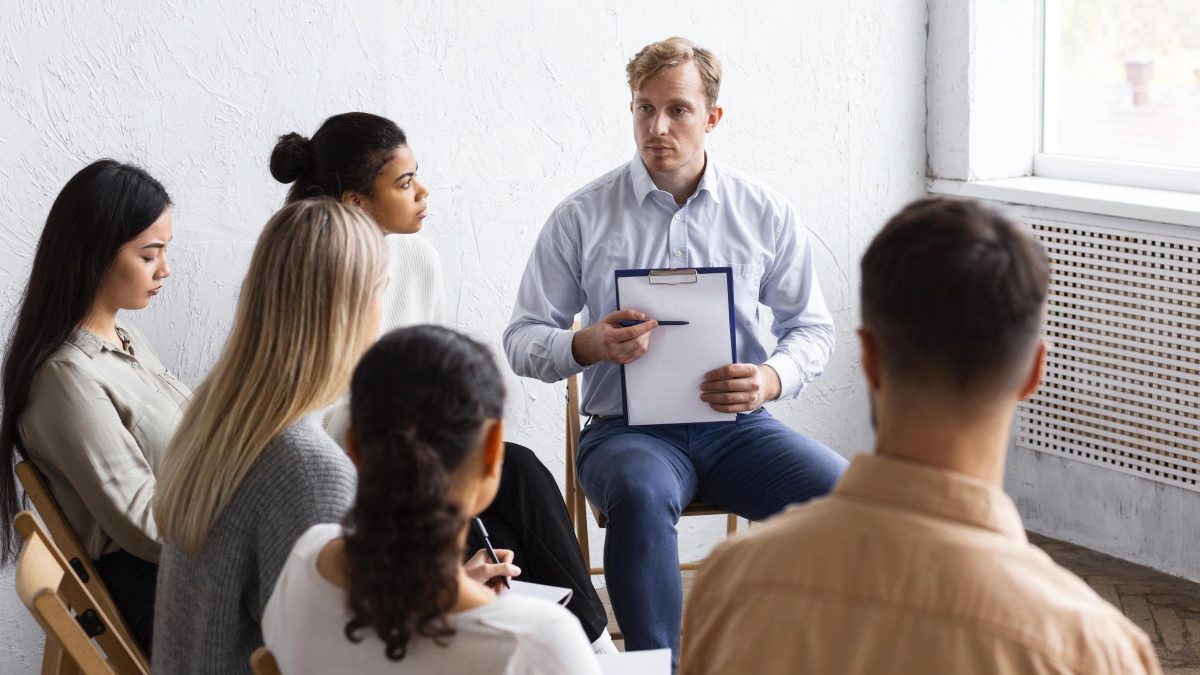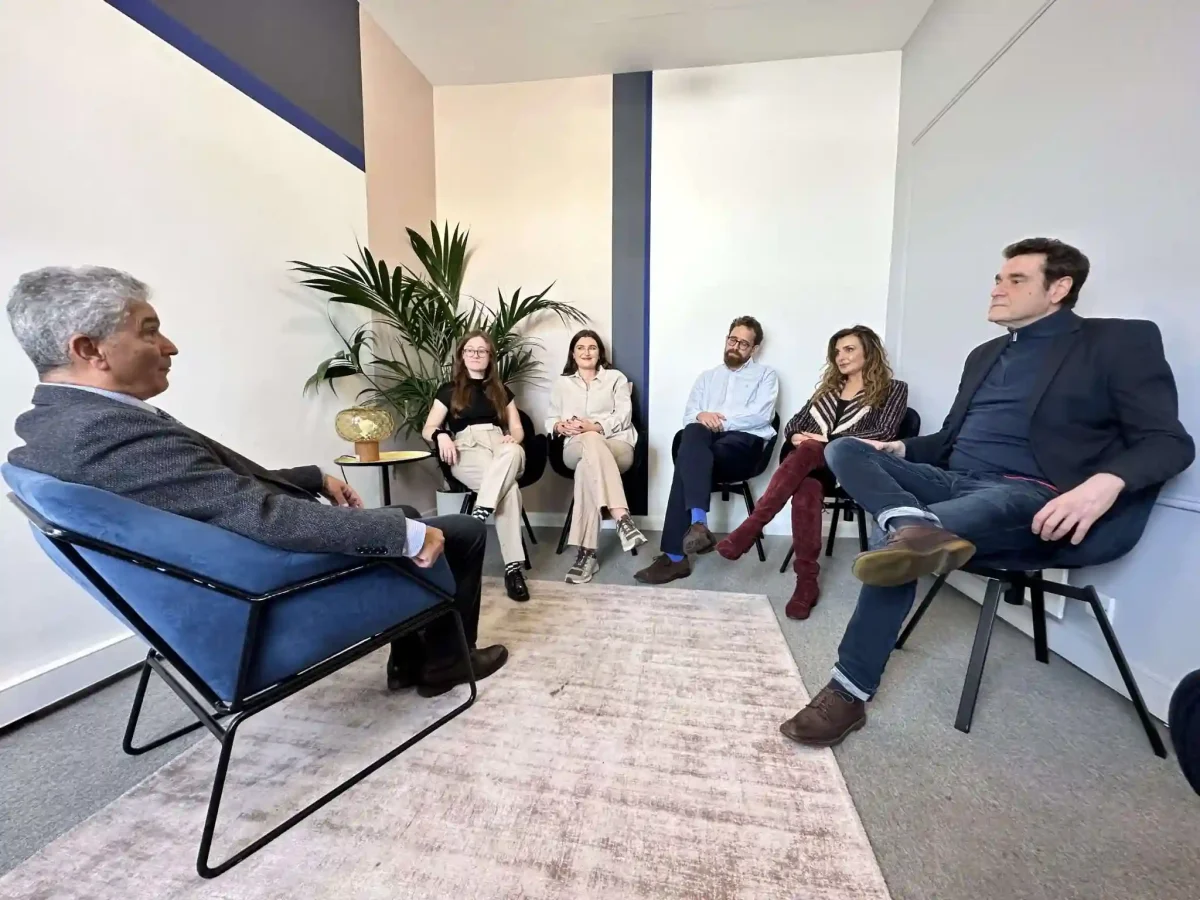
Supportive and Structured Groups
At CATCH Recovery, we offer group therapy sessions designed to provide a supportive and structured environment for individuals in recovery. Group therapy allows you to connect with others who share similar experiences, gain new insights, and build a sense of community. Led by experienced therapists, our sessions focus on developing coping strategies, improving communication, and fostering personal growth.
We offer:
- Small group sessions for shared support and connection
- Therapist-led discussions on addiction recovery and mental health
- A safe and confidential space to explore emotions and challenges
- Opportunities to learn from others and develop resilience
Contact us today on 020 3098 2503 to learn more about our group therapy sessions and find the right support for your situation. You don’t have to go through this alone—our experienced therapists are here to help.
What Is Group Therapy for Addiction?
Group therapy is a form of therapy where you participate in regular sessions with a trained therapist and a group of 6-12 people to combat your addiction problems and gain support from others. It provides a safe and supportive environment to share experiences, struggles, and emotions with people who are going through similar challenges. Our therapists guide the sessions and ensure that everyone has an opportunity to be heard. You can learn from others through group therapy, develop new coping strategies, and build a strong support network.

Opening up may feel challenging, but witnessing others sharing can encourage you to do the same. The group offers more than support; it also provides opportunities for growth, accountability, and mentorship. Together, we can navigate the path towards recovery and create lasting experiences that provide learning and hope.
How Does Group Therapy Help Addiction?
By actively participating in group discussions you can gain valuable insights, perspectives, and coping strategies that may inspire positive changes in your life. Additionally, being surrounded by people who are committed to their recovery can foster a sense of belonging, acceptance, and accountability. Through mutual support and shared experiences, group therapy can empower you on your path towards lasting healing and growth.
Different Types of Group Therapy
You can find a number of different types of group therapy that vary in setting and content. A number of these are described below and can be found in different outpatient and residential addiction treatment programmes:
- Psychoeducational groups – Expand your understanding of addiction and mental health by exploring a variety of topics. Gain insight into the disease of addiction, treatments such as medications, and medical and mental conditions that can impact recovery. Delve into the impact of trauma and strategies for preventing relapse. Additionally, discover key healthy lifestyle components that can support your journey towards sobriety. Through substance misuse group therapy sessions, you will be encouraged to apply these topics to your own experiences and challenges.
- Interpersonal process groups – Joining these groups is an opportunity to address personal issues, find solutions, and improve group dynamics. You can receive valuable feedback and support by sharing your concerns with others. Interpersonal process groups offer a unique chance to explore your relationships with others in a safe and supportive environment. As you interact with group members, you may discover similarities to your interactions with family and loved ones. This can help you gain insight into relationship dynamics and develop more effective communication skills.
- Women-Only Groups – These groups provide a safe and comfortable setting for women in recovery to share their stories and open up about their feelings that may otherwise be kept hidden. These groups are free from judgement and confrontation, creating a safe space to develop community, discuss common issues (such as motherhood, the portrayal of women in society, and marital issues), and to support and uplift each other throughout recovery.
- Therapeutic Skills development groups – Joining this group can equip you with effective tools to prevent relapse and develop practical skills for daily life. You’ll benefit from learning techniques such as drug refusal, improved communication, anger management, relaxation, and coping strategies for urges and triggers.
- Cognitive–behavioural/problem-solving groups – In order to identify potential self-destructive behaviours, these groups employ a variety of techniques to help members recognise their thinking and relational patterns. By participating in these groups, you will develop problem-solving skills, set achievable goals, and gain the ability to identify behaviours and emotions that may trigger substance misuse.
- Support groups –Joining these groups can significantly aid in coping with daily challenges and staying sober. The groups offer valuable peer support and promote accountability, which is particularly crucial during the initial stages of recovery.
- Inpatient rehab groups – For those who need an inpatient treatment programme, therapist-led group is an invaluable asset. With their specialist training and expertise, they can provide evidence-based tested strategies and guidance to help you make the most of the group experience.
Group therapy is a practical approach in addiction counselling as it combines professional guidance with the power of peer support to help you overcome your addiction.
I’m nervous about talking in front of others – will group therapy be difficult for me?
It’s understandable that being in a group setting could make you feel nervous initially. However, it’s important to remember that group therapy is designed to provide a safe and supportive environment. The therapist leading the sessions is trained to create a space that promotes comfort and respect for each participant. They will ensure that everyone has an opportunity to share their thoughts and feelings while also offering guidance and support throughout the process.
Additionally, being in a group setting allows you to witness others opening up, which can encourage vulnerability and help you feel less alone in your journey.